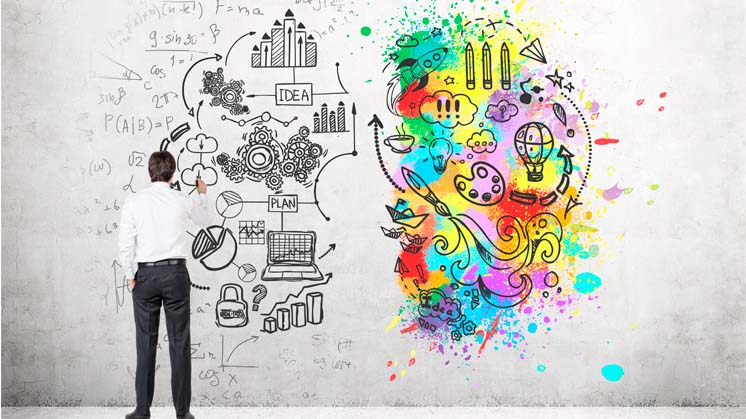Polymathy
The benefits of being a polymath
Polymathy is known as the ability to achieve excellence in several areas of knowledge. The term comes from the Greek πολυμαθής ('polymathós'), which means "one who knows many things" and is often likened to what has come to be called the 'Renaissance woman or man' of whom Leonardo Da Vinci is considered to be the greatest exponent. But are there fewer polymaths nowadays, is it more difficult to be one, and what are the advantages and disadvantages?

Polymaths are characterised by a great curiosity that leads them to continuous learning and involvement in different areas, especially in some with different expressions as it is not only about accumulating knowledge but also about applying and expressing it. The connection of this type of person between the right hemisphere of the brain, which handles emotions, and the left hemisphere, which controls logic, through the corpus callosum, is higher, but this is not only a genetic expression but also a response to environmental stimuli. In other words, the polymath is born and made.
However, it is not a question of acquiring knowledge of different subjects, but rather that this knowledge allows for a multiple domain when it comes not only to interpreting reality but also to acting on it. This puts an end to the domain of hyper-specialisation and incorporates disciplines such as artistic creation or sports practice, moving from the STEM paradigm (Science, Technology, Engineering and Mathematics) to STEAM, incorporating the Arts into the formula with the breadth of that word.

Pioneering women in other sectors
Many women have broken barriers to shine. Discover some of them!

Critical thinking
Critical thinking has a great importance in today's society.

What is multitasking?
Find out what it means and why this profile is so important for companies.
Famous polymaths of yesterday and today
It is logical to assume that today there is the same percentage of people with the necessary characteristics to be a polymath as in the 15th century, and yet the names of these great famous polymaths and renaissance women such as Copernicus, Hypatia, Galileo, Descartes or Newton seem to be a thing of the past. The reason has more to do with the vastness of today's knowledge than with people's abilities, which is why it seems easier to specialise in something nowadays.
It is a well-known anecdote that in 1962 US President John F. Kennedy brought together no less than 49 Nobel laureates and claimed that he believed it was the most talented and knowledgeable people ever assembled in the White House, except perhaps on the days when Thomas Jefferson dined alone. The third president of the United States is best known for drafting the Declaration of Independence, but he was also an architect - he created and designed the University of Virginia -, led archaeological excavations - he is considered one of the fathers of archaeology - and has a number of inventions to his credit, such as the swivel chair.
Today, those considered as polymaths are those who have not stuck to a single area of knowledge and have dedicated themselves to exploring different opportunities by taking advantage of the circumstances offered by technological evolution and the increasingly blurred boundaries of scientific disciplines. The Internet offers knowledge at the click of a button. A current example is Natalie Portman, a well-known actress but also a director, dancer and psychologist, or Elon Musk, who studied physics and economics, programmed from the age of 10, co-founded the online payment company Paypal, led the creation of Tesla and is now working on reaching Mars.
Famous Polymaths

Hypatia de Alexandria
Alexandria Egypt
Mathematician, astronomer and philosopher

Leonardo Da Vinci
Florence Italy
Painter, musician, writer, sculptor, anatomist, inventor, town planner, engineer, architect, philosopher, poet and botanist

Nicolas Copérnico
Thorn Poland
Mathematician, astronomer, physicist, economist, jurist, clergyman, diplomat and governor

Galileo Galilei
Pisa Italy
Astronomer, engineer, mathematician, physicist and philosopher

René Descartes
La Haye en Touraine France
Mathematician, physicist and philosopher

Isaac Newton
Woolsthorpe England
Physicist, inventor, alchemist, theologian and mathematician

Thomas Jefferson
Shadwell USA
Architect, archaeologist, paleontologist, inventor and US President

José Echegaray
Madrid Spain
Mathematician, playwright, engineer, politician and Nobel Laureate in Literature

Ernesto Sábato
Rojas Argentina
Novelist, essayist, physicist and painter

Elon Musk
Pretória South Africa
Economist, physicist, inventor and entrepreneur

Natalie Portman
Jerusalem Israel
Actress, writer, director, psychologist, producer and dancer
Sources: own elaboration.
 SEE INFOGRAPHIC: Famous polymaths throughout history [PDF]
SEE INFOGRAPHIC: Famous polymaths throughout history [PDF]
Polymaths: advantages and disadvantages
More than a few studies highlight the advantages of being a polymath in today's world. For example, the Journal of Psychology of Science and Technology suggested that, compared to other scientists, Nobel Prize winners are more involved in parallel artistic projects and hobbies and are therefore closer to the profile of a polymath. Similar conclusions were drawn by other research from Michigan State University that compared different artistic hobbies and related them to the chances of winning a Nobel Prize.
The main advantages of polymaths today are:
![]() They function as generators of innovations
They function as generators of innovations
![]() They enrich working groups
They enrich working groups
![]() They have a greater capacity to adapt to change
They have a greater capacity to adapt to change
![]() They are intellectual crosstalks, bridges between specialised working groups.
They are intellectual crosstalks, bridges between specialised working groups.
![]() They show greater efficiency in the processes.
They show greater efficiency in the processes.
However, there is no shortage of experts who, at least at the present time, also find disadvantages in polymaths, especially in more conservative companies who may interpret their profiles as scattered without recognising the importance of someone to serve as a link between the specialist experts. Moreover, given the ever-decreasing life expectancy of companies and the high percentage of automation in many jobs, the innovation that comes with polymathy is increasingly seen as a rising value.




